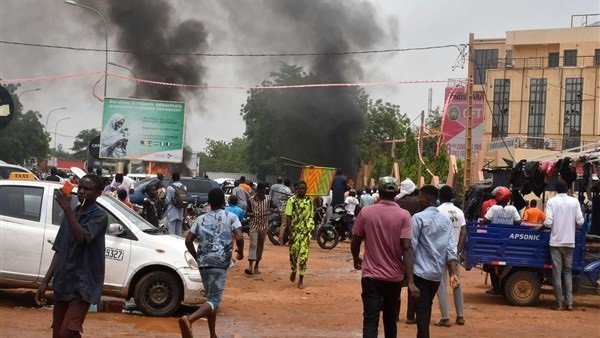Implications of European support for ECOWAS and Paris on the Niger crisis

In a new development in the Nigerien coup crisis, the European
Union spokesman for foreign affairs, Peter Stano, announced that the EU
categorically rejects the Nigerien military junta’s announcement of a
three-year transitional period, indicating that it supports the Economic
Community of West African States (ECOWAS) group’s position on the crisis rejecting
the transitional period announced in Niger.
During a press conference in Brussels on August 22, Stano
said, “We continue to support all the initiatives of the ECOWAS group, and we
have been informed that it has rejected the three-year transitional period
announced in Niger and the holding of elections after it. We at the European
Union support all of the group’s efforts, including
mediation to restore constitutional order in Niger.”
ECOWAS announced its categorical rejection of the Nigerien
military junta’s announcement of a three-year transitional period, which
indicates the complexity of efforts to end the crisis through diplomatic means.
In continuation of the EU’s position on the crisis in Niger,
the EU showed its support for the French ambassador to Niger after the military
junta announced his expulsion and gave him 48 hours
to leave the country. The spokeswoman for the EU’s diplomatic department said
that the Nigerien coup leaders’ decision to expel the French ambassador “is a
provocation that will not contribute to achieving a diplomatic solution to the
crisis.”
Military shield
The EU's position comes at a time when African countries are
threatening to act as a “military shield” to confront any Western attack on
Niger, led by Mali and Burkina Faso, in conjunction with ongoing internal
demonstrations rejecting military intervention in Niger and calls by the military
junta for the armed forces to be prepared and always on alert to confront any
invasion in light of the increasing threats.
Implications of the European position
Sufyan Mohammed, a Nigerien academic writer and researcher,
explained in special statements to the Reference the implications of the
European Union’s position, its causes, and its repercussions on the crisis in
Niger, pointing out that the reasons for the EU’s position are due to the
mentality of Western countries in supporting the alleged democratic system globally,
as there were treaties and agreements between the EU and the African countries,
and there is nothing that would sever those relations between the two parties
other than a coup against the democratic regimes. If Western politicians
support the coup in Niger, it is as if they lied and refuted themselves and
what they claim.
Mohammed explained that the moderate image in Western
politics is to support countries whose people chose their presidents through
ballot boxes and not through force, although this does not prevent the
existence of hidden agendas that serve the Western side in its relations with
other countries and the interests of EU countries with regimes that are subject
to coups.
He added that if Western countries supported coups and
disrupting political work in the region, even with countries and rulers opposed
to them, that would be an open door to disrupting political work in the world,
and their statement would be contrary to their claimed support for countries
that respect the freedom of the people to choose who represents them in their
governments.
Regarding the impact of the European Union’s support for
ECOWAS’s position and the extent of its ability to resolve the crisis, Mohammed
said that determining this depends on the circumstances of the war once it
breaks out, but it will strengthen ECOWAS’s position and help in approving this
position even in the United Nations.







